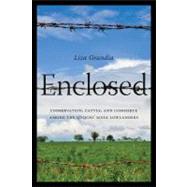Enclosed
, by Grandia, Liza- ISBN: 9780295991658 | 0295991658
- Cover: Hardcover
- Copyright: 2/8/2012
This impassioned and rigorous analysis of the territorial plight of the Q'eqchi Maya of Guatemala highlights an urgent problem for indigenous communities around the world--repeated displacement from their lands. Liza Grandia uses the tools of ethnography, history, cartography, and ecology to explore the recurring enclosures of Guatemala's second largest indigenous group, who number a million strong. Having lost most of their highland territory to foreign coffee planters at the end of the 19th century, Q'eqchi' people began migrating into the lowland forests of northern Guatemala and southern Belize. Then, pushed deeper into the frontier by cattle ranchers, lowland Q'eqchi' found themselves in conflict with biodiversity conservationists who established protected areas across this region during the 1990s. The lowland, maize-growing Q'eqchi' of the 21st century face even more problems as they are swept into global markets through the Dominican Republic-Central America Free Trade Agreement (DR-CAFTA) and the Puebla to Panama Plan (PPP). The waves of dispossession imposed upon them, driven by encroaching coffee plantations, cattle ranches, and protected areas, have unsettled these agrarian people. Encloseddescribes how they have faced and survived their challenges and, in doing so, helps to explain what is happening in other contemporary enclosures of public "common" space. "Liza Grandia connects global economics, local livelihoods, and concerns for cultural survival in a way few writers manage to do. Enclosedmakes transparent the social processes underpinning tropical deforestation, entrenched poverty, and the vulnerabilities created by global capital." -Nora Haenn, author of Fields of Power, Forests of Discontent: Culture, Conservation and the State of Mexico"A compelling read and a significant scholarly contribution to our understanding of indigenous communities dealing with the destructive but also seductive penetration of global corporate interests." -Eugene Hunn, author of A Zapotec Natural History: Trees, Herbs, and Flowers, Birds, Beasts, and Bugs in the Life of San Juan Gbee Liza Grandiais assistant professor of international development and social change at Clark University. Since 1993, she has worked with NGOs and carried out research in the northern Maya lowlands of Guatemala and Belize.






